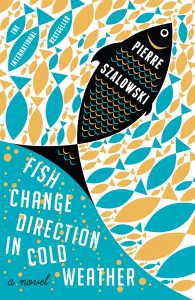Published by Canongate Books 3 January 2013
272pp, paperback, £8.99
In January 1998, an ice storm takes hold of Montreal just as the parents of an unnamed ten-year-old boy reveal they are splitting up.‘No child deserves this,’ says the boy. ‘We should have all been together. Dad in front of the television, Mum reading in the kitchen, and me somewhere in between.’
The extreme weather causes everything to be covered in a fine layer of ice – ‘The cars looked like they’d been wrapped in cellophane, like sweets’ – but the intent of this frost-bound debut from former video game publisher Pierre Szalowski is clearly to warm the cockles.
Intermittently narrated by the savvy only-child of a divorcing couple – the father goes to their summer cottage and the mother splits their possessions on an Excel spreadsheet – it’s rich in the brand of artful wisdom easily imagined as a Hollywood voice-over. ‘Children can’t decide things, I should have realized that right from the start. There’s not a thing you can do once your parents have decided to split up,’ says the boy. ‘Adults can be really mean when they don’t understand a kid.’
While fearing he will become the ‘fourteenth kid in my class to have to migrate every week’, the boy also hopes for an outcome ‘like in the movies’ with The End flashing up above the heads of a kissing couple. And so it may prove, in more cases than one.
With four of the five power lines supplying the city taken out, the likes of Julie, a stripper, and eccentric Russian mathematician Boris are drawn together (the title comes from his research into the behaviour of fish), while gay couple Simon and Michel, living as ‘brothers’ with their small dog, Pipo, befriend a cantankerous neighbour, Alexis, and his son, Alex, who is on the verge of going off the rails.
Likely to raise a smile are our young hero’s comments on the Russian attitude to drinking: ‘The main thing is to forget everything, to let yourself go and, above all, never to stop,’ while Julie, the tart with a heart, has a philosophy on love which is ripe for a promotional film poster: ‘Love is like a taxi: if it doesn’t stop when you run after it, then it’s already taken. To catch one up you just have to wait in the right spot.’
For all its strippers, gay love, and outsiders, at this book’s heart is small community neighbourliness which reaches big screen schmaltz proportions as the city nears a total blackout. ‘When the heavens won’t help, we have to help each other. Right?’ says one character.
Szalowski is a screenwriter and the book offers plenty of comforting conceits and lines screaming for the film adaptation. ‘You always want more, even though you haven’t really appreciated what you’ve already got,’ says the boy. It doesn’t take a great leap of the imagination to picture a Macaulay Culkin look-a-like in a Christmas film version telling us, ‘In the end, hurting other people doesn’t make you feel any better.’
Until that time, it’s one for those who enjoy happy conclusions – even if they’re spent Christmas fighting with the family. Remember, everyone: ‘Often the moments we miss the most are the ones we didn’t especially enjoy at the time.’

